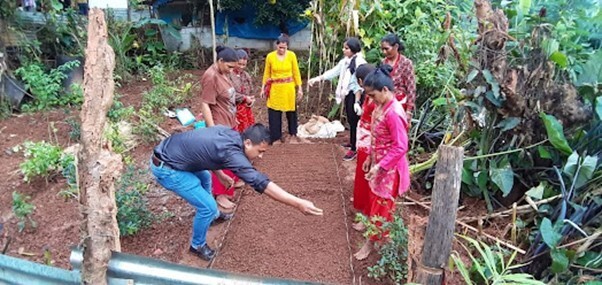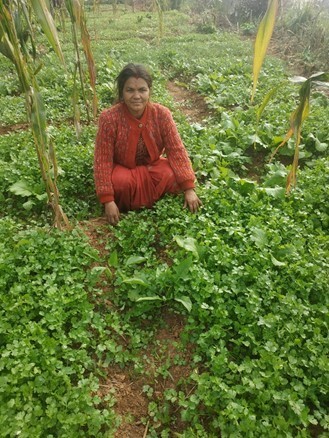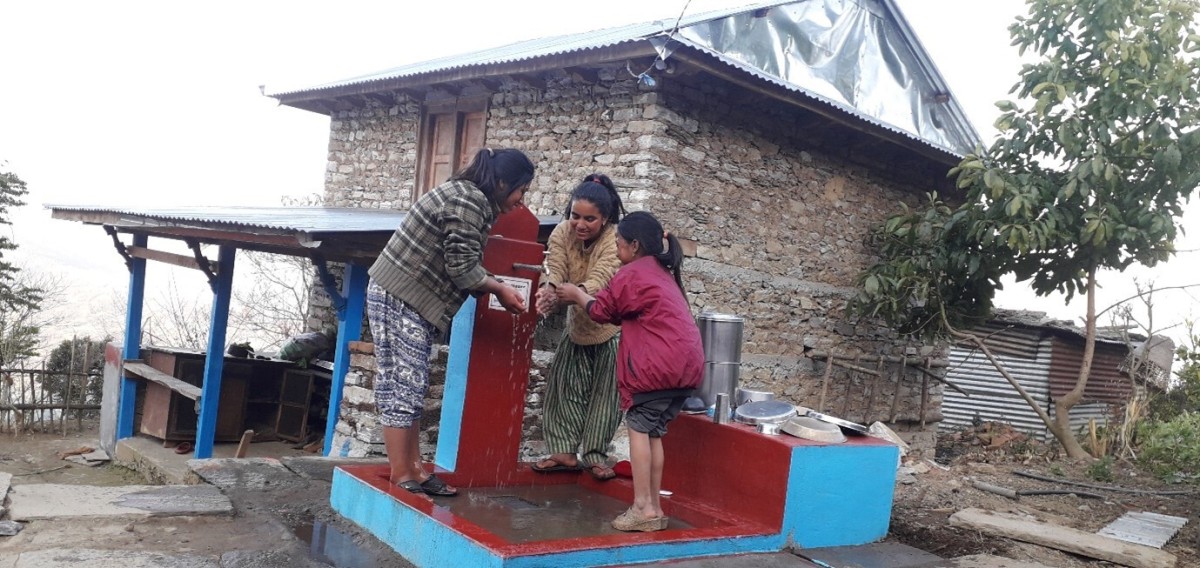How kitchen gardens turn women into leaders
For Saraswati Giri the future looks brighter. Upon following a special kitchen garden training, she started her own garden, where she cultivates organic green vegetables.
By Rakshya Neupane (from Simavi-partner SEBAC) and Emma Zieck (Simavi)
A vegetable garden nurtured by domestic wastewater: for the 50-year-old Mrs. Saraswati Giri living in the Sindhupalchowk district in Nepal this makes all the difference. And that goes way beyond the fresh vegetables and extra income her garden provides.
Women have to fetch water multiple times a day
Life is not easy in the districts of Dolakha and Sindhupalchowk, especially for women and girls. Traditionally, they are responsible for the household chores, and that includes fetching water for the family. It is a physically demanding task, forcing women to travel multiple times a day to the nearest water source.
In the meantime, climate change is hitting the communities living in the districts of Dolakha and Sindhupalchowk hard. Water shortages, both for drinking and irrigation, have been making daily life more difficult.
80 percent of water supply systems damaged
The devastating earthquake that occurred in 2015 made things worse. It damaged more than 80 percent of the water supply systems in the region. Erratic rainfalls, also a consequence of the climate crisis, have made life more uncertain.
Especially for farmers who depend on rainfall to determine sowing and harvesting periods. A major threat to food security and economic growth.
Special training
But for Saraswati Giri the future looks brighter than before. After following a special kitchen garden training for the users of the drinking water supply schemes, she started her own garden.
‘Now I can cultivate organic green vegetables for my family and also earn by selling the surplus vegetables in the nearby market’, she tells. ‘As people know that I am growing vegetables organically in my kitchen garden, I am even receiving pre-orders.’

Knowledge and capacities of women
Not only is she saving expenses and gaining some extra income, she’s also a local expert now on natural ways to mitigate insect pests, techniques of composting and the cultivation of drought-resistant crops.
Knowledge that builds on the indigenous knowledge and capacities of community members, particularly women.

Leadership qualities and empowerment
Not only is Saraswati Giri feeling the satisfaction of harvesting healthy and nutritious food for her family and her customers, as she expresses it, she has also become a leader in her community.
Because of her enthusiasm to learn and work for the community, Saraswati Giri was given the opportunity to become a treasurer of one of the drinking water supply schemes in her neighbourhood. She also became a member of the water and sanitation users’ group, which helped her to develop her leadership qualities.
She has set up her own farmers group that is now legally registered in her municipality. In addition, she has empowered two other women to join the same group. They have started coordinating with various government bodies and other supportive organisations to receive agricultural subsidies and have also participated in different capacity development programmes.
Women, Water and Leadership in the ASHA programme
The Access to Sanitation and Hygiene (ASHA) programme that is implemented by SEBAC Nepal, with the support of Simavi and Dopper, has been trying to mitigate the effects of climate change on the lives of the most left behind communities, who still lack access to water. The programme focuses on the construction and renovation of drinking water supply schemes in areas where the water source is scarce.
In the programme areas, the objective is to provide universal and equitable access to safe and affordable drinking water, by placing a water facility at the doorstep of every household. The communities, and especially the women, are actively involved in the development of the water schemes. Through trainings on leadership and WASH, and the establishment of women networks, the programme tries to ensure that women’s needs and wishes are being addressed.



